Related Research Articles
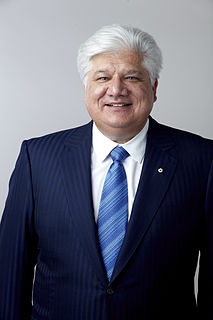
Mihal "Mike" Lazaridis, OC, O.Ont, FRS is a Greek-Canadian businessman, investor in quantum computing technologies, and founder of BlackBerry, which created and manufactured the BlackBerry wireless handheld device. Lazaridis served in various positions including Co-Chairman and Co-CEO of BlackBerry from 1984 to 2012 and Board Vice Chair and Chair of the Innovation Committee from 2012 to 2013. As a passionate advocate for the power of basic science to improve and transform the world, he co-founded Quantum Valley Investments in March 2013 with childhood friend and BlackBerry co-founder Douglas Fregin to provide financial and intellectual capital for the further development and commercialization of breakthroughs in quantum information science. In 1999 he founded Perimeter Institute for Theoretical Physics, where he also serves as Board Chair. In 2002, he founded the Institute for Quantum Computing. He is also a former chancellor of the University of Waterloo, and an Officer of the Order of Canada. With an estimated net worth of US$800 million, Lazaridis was ranked by Forbes as the 17th wealthiest Canadian and 651st in the world.
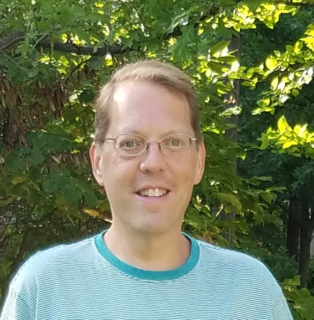
David A. Bader is a Distinguished Professor and Director of the Institute for Data Science at the New Jersey Institute of Technology. Previously, he served as a Professor, Chair of the School of Computational Science and Engineering, and Executive Director of High-Performance Computing in the Georgia Tech College of Computing. In addition, Bader was selected as the director of the first Sony Toshiba IBM Center of Competence for the Cell Processor at the Georgia Institute of Technology. He is an IEEE Fellow, AAAS Fellow, SIAM Fellow. His main areas of research are in at the intersection of high-performance computing and real-world applications, including cybersecurity, massive-scale analytics, and computational genomics.

Srinivasan Keshav is the Robert Sansom Professor of Computer Science at the University of Cambridge, with effect from 1 October 2019.

Joachim Sauer is a German quantum chemist and professor emeritus of physical and theoretical chemistry at the Humboldt University of Berlin. He is the husband of the chancellor of Germany, Angela Merkel. He is one of the seven members of the board of trustees of the Friede Springer Foundation, together with former German president Horst Köhler and others.
Rahul Sarpeshkar is the Thomas E. Kurtz Professor and a Professor of Engineering, Professor of Physics, Professor of Microbiology & Immunology, and Professor of Molecular and Systems Biology at Dartmouth. Sarpeshkar, whose interdisciplinary work is in bioengineering, electrical engineering, quantum physics, and biophysics, is the inaugural chair of the William H. Neukom cluster of computational science, which focuses on analog, quantum, and biological computation. The clusters, designed by faculty from across the institution to address major global challenges, are part of President Philip Hanlon’s vision for strengthening academic excellence at Dartmouth. Prior to Dartmouth, Sarpeshkar was a tenured professor at the Massachusetts Institute of Technology and led the Analog Circuits and Biological Systems Group. He is now also a Visiting Scientist at MIT's Research Laboratory of Electronics.

Nuclear magnetic resonance quantum computing (NMRQC) is one of the several proposed approaches for constructing a quantum computer, that uses the spin states of nuclei within molecules as qubits. The quantum states are probed through the nuclear magnetic resonances, allowing the system to be implemented as a variation of nuclear magnetic resonance spectroscopy. NMR differs from other implementations of quantum computers in that it uses an ensemble of systems, in this case molecules, rather than a single pure state.

George McClelland Whitesides is an American chemist and professor of chemistry at Harvard University. He is best known for his work in the areas of Nuclear magnetic resonance spectroscopy, organometallic chemistry, molecular self-assembly, soft lithography, microfabrication, microfluidics, and nanotechnology. A prolific author and patent holder who has received many awards, he received the highest Hirsch index rating of all living chemists in 2011.
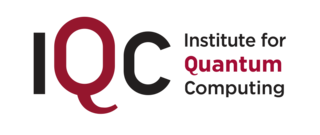
The Institute for Quantum Computing (IQC) is an affiliate scientific research institute of the University of Waterloo located in Waterloo, Ontario with a multidisciplinary approach to the field of quantum information processing. IQC was founded in 2002 primarily through a donation made by Mike Lazaridis and his wife Ophelia whose substantial donations have continued over the years. The institute is now located in the Mike & Ophelia Lazaridis Quantum-Nano Centre and the Research Advancement Centre at the University of Waterloo.
Arthur J. Carty,, is a Canadian academic and former National Science Advisor to the Government of Canada.
Daniel Amihud Lidar is the holder of the Viterbi Professorship of Engineering at the University of Southern California, where he is a Professor of Electrical Engineering, Chemistry, Physics & Astronomy. He is the Director and co-founder of the USC Center for Quantum Information Science & Technology (CQIST) as well as Scientific Director of the USC-Lockheed Martin Quantum Computing Center, notable for his research on control of quantum systems and quantum information processing.
Raymond Laflamme, OC, FRSC is a Canadian physicist and founder and until mid 2017, was the director of the Institute for Quantum Computing at the University of Waterloo. He is also a professor in the Department of Physics and Astronomy at the University of Waterloo and an associate faculty member at Perimeter Institute for Theoretical Physics. Laflamme is currently a Canada Research Chair in Quantum Information. In December 2017, he was named as one of the appointees to the Order of Canada.

Scott Joel Aaronson is an American theoretical computer scientist and David J. Bruton Jr. Centennial Professor of Computer Science at the University of Texas at Austin. His primary areas of research are quantum computing and computational complexity theory.
Richard Erwin Cleve is a Canadian professor of computer science at the David R. Cheriton School of Computer Science at the University of Waterloo, where he holds the Institute for Quantum Computing Chair in quantum computing, and an associate member of the Perimeter Institute for Theoretical Physics.
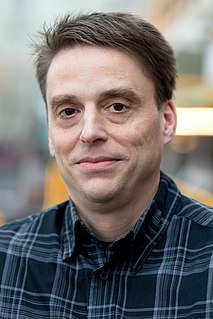
John Harrison Watrous is a professor of computer science at the David R. Cheriton School of Computer Science at the University of Waterloo, a member of the Institute for Quantum Computing, an affiliate member of the Perimeter Institute for Theoretical Physics and a Fellow of the Canadian Institute for Advanced Research. He was a faculty member in the Department of Computer Science at the University of Calgary from 2002 to 2006 where he held a Canada Research Chair in quantum computing.
Michele Mosca is co-founder and deputy director of the Institute for Quantum Computing at the University of Waterloo, researcher and founding member of the Perimeter Institute for Theoretical Physics, and professor of mathematics in the department of Combinatorics & Optimization at the University of Waterloo. He has held a Tier 2 Canada Research Chair in Quantum Computation since January 2002, and has been a scholar for the Canadian Institute for Advanced Research since September 2003. Mosca's principal research interests concern the design of quantum algorithms, but he is also known for his early work on NMR quantum computation together with Jonathan A. Jones.
Mary Beth Ruskai is an American mathematical physicist and Professor Emerita of Mathematics at the University of Massachusetts, with interest in mathematical problems in quantum theory. She is a Fellow of the AAAS, AMS, and APS.
Barbara M. Terhal is a theoretical physicist working in quantum information and quantum computing. She is a researcher at the Forschungszentrum Jülich, a Professor in the EEMCS Department at TU Delft, as well as the Research Lead for the Terhal Group at QUTech. Her research concerns many areas in quantum information theory, including entanglement detection, quantum error correction, fault-tolerant quantum computing and quantum memories.
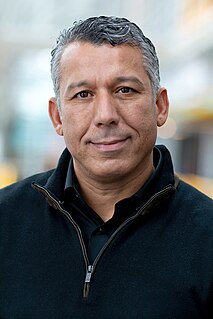
Raouf Boutaba is an Algerian Canadian computer scientist. His research interests are in resource, network and service management in wired and wireless networked systems. His work focuses on network virtualization, network softwarization, cloud computing, and network security.
Alán Aspuru-Guzik is a professor of chemistry and computer science at the University of Toronto. His research group studies machine learning, quantum computing, and automated chemistry. He is the chief scientific officer and founder of quantum computing startup Zapata Computing.

{{Infobox scientist | name = Anil Kumar | image = Anil iisc.gif | alt = | caption = | birth_date = 25 June 1941 | birth_place = | death_date = | death_place = | nationality = Indian | spouse = Padma Kumar | children = Pankaja and Ankur | known_for = Studies on [[Nuclear magnetic resonance spectroscopy],[Quantum information processing]] }}
References
- 1 2 3 Faculty profile, University of Waterloo, retrieved 2014-07-16.
- 1 2 David Cory, Canada Excellence Research Chairs, Government of Canada, accessed 2014-07-16.
- ↑ "Alum Updates" (PDF), The Case Chemist, 104: 7, Winter 2010–2011.
- ↑ Worldcat entry for Cory's dissertation, "Applications of cross polarization spin dynamics in solids", retrieved 2014-07-16.
- ↑ Lloyd, Seth (2006), Programming the Universe: A Quantum Computer Scientist Takes on the Cosmos, Knopf Doubleday Publishing Group, pp. 151–152, ISBN 9780307264718 .
- ↑ "Quantum computer in a cup of joe?", Science News, 17 January 1997.
- ↑ "Quantum dreams", The Economist , March 8, 2001.
- ↑ "MIT researchers create quantum computer that simulates quantum system", MIT News, June 25, 1999